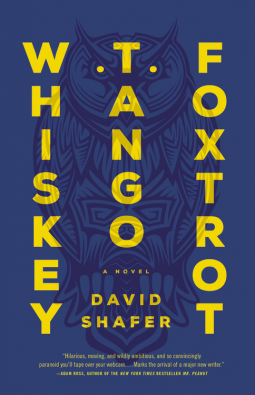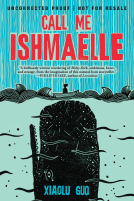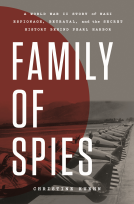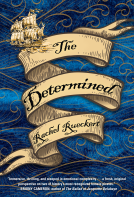
Whiskey Tango Foxtrot
by David Shafer
This title was previously available on NetGalley and is now archived.
Send NetGalley books directly to your Kindle or Kindle app
1
To read on a Kindle or Kindle app, please add kindle@netgalley.com as an approved email address to receive files in your Amazon account. Click here for step-by-step instructions.
2
Also find your Kindle email address within your Amazon account, and enter it here.
Pub Date Aug 05 2014 | Archive Date Nov 28 2014
Description
Three young adults grapple with the usual thirty-something problems--boredom, authenticity, an omnipotent online oligarchy--in David Shafer's darkly comic debut novel.
Leo and Mark were best friends in college, but early adulthood has set them on diverging paths. Growing increasingly disdainful of Mark's platitudes, Leo publishes a withering takedown of his ideas online. But the Committee is reading--and erasing--Leo's words. On the other side of the world, Leila's discoveries about the Committee's far-reaching ambitions threaten to ruin those who are closest to her.
In the spirit of William Gibson and Chuck Palahniuk,Whiskey Tango Foxtrot is both a suspenseful global thriller and an emotionally truthful novel about the struggle to change the world in- and outside your head.
Advance Praise
“Hilarious, moving, and wildly ambitious, David Shafer’s Whiskey Tango Foxtrot reads like a plot against America dreamed up by the NSA and then ghostwritten by Don DeLillo…Forget debut: it marks the arrival of a major new writer.” —Adam Ross, author of Mr. Peanut
“Roaming from Burma to Oregon to a mysterious ship in the open ocean, David Shafer’s debut novel is a stylish, absorbing, sharply modern hybrid of techno thriller and psychodrama that bristles with wit and intellect and offers a dark, incisive vision of the global consequences of turning our lives into collectable data.” —Maggie Shipstead, author of Seating Arrangements
“Outlandishly clever. Evoking the technological-paranoia of Philip K. Dick and the verbal pyrotechnics of David Foster Wallace, Shafer’s digital take-over is absurdly comical and all too familiar. The characters are complicated, fascinating, and fully engaging while the threats feel frighteningly real.” —Joe Meno, author of The Great Perhaps
“David Shafer’s amazing debut novel should be a controlled substance, its addictive quotient of the highest order. I devoured it imagining this is what a brainstorming event between Thomas Pynchon and Edward Snowden would deliver.” –Bob Shacochis, author of The Woman Who Lost Her Soul
“Hilarious and chilling, fast-paced and thoughtful…While the novel reads like a comic thriller, it speaks powerfully to our over-connected, over-watched, privacy-depleted moment.” —Ken Kalfus, author of Equilateral and A Disorder Particular to the Country
Available Editions
| EDITION | Other Format |
| ISBN | 9780316252638 |
| PRICE | $26.00 (USD) |
Average rating from 80 members
Featured Reviews
 Jill B, Reviewer
Jill B, Reviewer
Three main characters in their mid-thirties, seemingly unconnected, become unwitting players in a control for online information. This edgy, dark but also comedic novel describes a potential dystopian state of affairs in which the personal becomes the property of large corporations, who want to use it as they wish, and sell it back to you for a price.
Leila Majnoun is an attractive American woman trying to make a difference in health care in Myanmar, who inadvertently stumbles upon the U.S. Government involved in something she shouldn’t have seen. Leo Crane, a good-hearted but misguided and substance-abusing neer-do-well, has just lost his job as a preschool teacher in Portland, Oregon. And Mark Deveraux is a drug-addled, alcohol-addicted self-help guru in New York who has come to the attention of wealthy and powerful James Straw, the “squillionaire” of SineCo, a digital search-and-storage conglomerate.
SineCo is supported by a clandestine U.S. military organization called the Central Security Service, or CSS, the mission of which, since 9/11, has been “to build and maintain the world’s supreme electronic intelligence-gathering apparatus and cyberdefense infrastructure.” The CSS uses a few private-sector endeavors for intellectual capital and leading-edge technology. In return, the CSS provides cover for the companies’ R& D “that, in order to be valuable and effective, must take place in zones unattached to a particular jurisdiction.”
With the help of the CSS, SineCo has formed “The Committee,” dedicated to privatizing any and all information found anywhere online, and putting it to their own uses. A secret counter-movement, called “Dear Diary” has also arisen to try and stop The Committee.
What Leila found in Myanmar was an operation run by The Committee. Even though she had no idea what she saw, she was curious about it, and emailed a few reporter friends with questions. This was enough for the CSS to arrange for her eviction from Myanmar.
Before leaving however, she receives a cryptic warning from Ned Swain. Ned is a CSS operative who has been a little shocked and disaffected by the increasingly nefarious direction CSS has been taking. He advises Leila to contact Dear Diary. With their help, soon Leila is connects with both Leo and Mark, and the three of them get involved in a scheme to help take down The Committee. Dear Diary is afraid that The Committee wants to do more than just influence the thought and language and culture and social order. They have seen documents indicating that The Committee is considering a “targeted genocide" program. In ten years or so, they will have collected enough biological and genetic material to have computers determine which five percent of the population should live so they can begin the world again with “Enhanced Humanity.”
But Leila, Leo and Mark have to grapple with a critically important question: how do they know that Dear Diary won’t also turn into The Committee? As Mark points out, revolutionaries usually end up eating their children, or as he phrases it, “distributors always become the assholes.”
Dear Diary has a way to help figure out the truth, called “The Test.” All three of them take it, and it gives them a new perspective on reality, and on each other. But is it enough to save the world?
Discussion: This is one of the growing number of books in a genre that looks at the (invariably deleterious) repercussions of the proliferation of online information and diminution of privacy. It is similar in a way to Dave Eggers’ book "The Circle", but this one is less allegorical. I like to wonder if it is more or less over the top than Eggers, but that’s because I like to pretend that these cautionary tales are *all* over the top.
There are some very funny satirical moments in this book, both subtle and overt - I especially loved the insider Proust joke. But I thought there was a bit too much rehashing of the main characters’ inner angst, and not enough development of some of the side characters, like Ned and James Straw, neither of whom I felt I really understood.
Evaluation: While this book just brushes the edges of being a thriller, I would categorize it more as political fiction, with a dark, satirical edge. Recommended for those who like to think about the possibilities for abuses of information collection and privacy.
Rating: 3.5/5
Published by Mulholland Books, an imprint of Little, Brown and Company, a division of Hachette Book Group, 2014
I did not expect to like this so much.
I'm not sure what I expected...perhaps something military, because of the title. That most certainly was not what it turned out to be.
The wacky but likable characters and exotic locations make an intricately detailed canvas for this darkly comic thriller. The conspiracy that is at the heart of the plot is altogether too believable to be comfortable. Makes you want to get rid of your computers, your phones, anything that could be taken over, and you wouldn't feel safe even then!
David Shafer has mixed mystery, psychological thriller, conspiracy theory, travelogue, computer science... the result is an amazingly unified and exciting read.
 Nicole O, Reviewer
Nicole O, Reviewer
There’s a lot to say about David Shafer’s WHISKEY TANGO FOXTROT.
First and most simple is that it is a novel that makes the reader think. It requires the reader to pay attention and to work at following the story. Any reader that does this will be rewarded, I promise.
Second is that the story is about three people; Leila Majnoun – a Persian-American humanitarian aid worker with a NGO in Burma, Leo Crane – the slightly off-kilter son of a board game fortune who likes pot and alcohol more than he should, and Mark Devreaux – the accidentally famous author of a self-help book who really could read a few more of those books himself.
There are tiny hiccups with the characters.
The first part of the novel is dedicated to Leila and she is the ideal character on which to base a story. She’s strong and sassy and determined. She’s doing charitable work when her parents wanted her to go to medical or law school, marry a rich man, and give them grandchildren.
Leo is the lovable goof of the story. At the start, he works in a day care center where he invents a game called Rolling Death. Is there anything more adorable than a guy working with kids too young for kindergarten and playing Rolling Death with them? No. Leo’s paranoia, only partially enhanced by copious amounts of pot, gets him in trouble and then in rehab. By a stroke of luck, some of his paranoia proves absolutely true. The way he deals with that revelation proves that the lovable goof can also be the dependable rock in life.
Mark got high and/or drunk and wrote a blog somebody liked. So they gave him a book deal (which every would-be writer is jealous of) to write a self-help book. This proves that fools get all the luck and he gets a fancy patron in one of the richest men in the world.
The hiccup is that I’d read a whole book about Leila, Leo was good enough, and I could’ve done without Mark entirely. But I think that’s how it was meant to be.
The main plot of the story is intriguing and alarming.
It’s sort of like the popular dystopian novels – it’s fiction but it’s so close to a possible reality that it’s a little unnerving. For example, after reading Shafer’s book, I can assure you that I am now wholeheartedly against Google Glasses. And I’m looking at things I post online (like this review) with an even healthier sense of skepticism and the feeling that someone – not necessarily the government but a cabal of filthy rich people on fancy yachts – is spying on me for nefarious purposes that they rationalize as entirely legitimate and helpful to little old me.
I love dystopian novels, though, and I love WHISKEY TANGO FOXTROT too.
WHISKEY TANGO FOXTROT is available for purchase in print, ebook, and audio form now.
(I received a copy of WHISKEY TANGO FOXTROT through NetGalley in return for an honest and original review. All thoughts are my own. This review will be posted on NetGalley, Goodreads, and my blog.)
 Erin P, Educator
Erin P, Educator
A book like David Shafer's Whiskey Tango Foxtrot isn't for everyone, but damn if it doesn't seem like this book was aimed directly at me.
Seriously, this book spoke to me:
Well, hi, there, Erin! Say, I know you like an accessible post-modern novel. I'm, like, one part Don DeLillo social satire and two parts Thomas Pynchon's Crying of Lot 49. Except, you know, super contemporary. Plus I kick off with a bad-ass female protagonist and my shifting point of view really highlights the nuances of the three different main characters. Oh, and I have a major scene set in Dublin. Oh, and one of my characters is struggling with his sense of what's real. And the whole thing is wrapped around this information conspiracy. (I even have a touching little love story!)
So, yeah, I adored this book.
I don't make comparisons to Pynchon and DeLillo lightly. I teach DeLillo's White Noise in my AP Literature and Composition class. I ask my students to write a sequel of sorts after we discuss it - What would today's version of White Noise look like? They're meant to mimic DeLillo's style and advance the themes of consumerism and technology, family and identity. This year I'll be excerpting Whiskey Tango Foxtrot as a model for the assignment, because that is precisely what Shafer does. First, he shares DeLillo's love-mock relationship with his characters. Clearly they are held up for ridicule, especially in their addictions to substances (including consumer goods), but paired with that is a strong affection. That affection grows as the novel goes on, and by the end, I was absolutely enamored with each of the main protagonists. Likewise, Shafer uses lists of stuff at various points in an echo of DeLillo. Atop all of this is a specificity of diction that borders on the poetic.
The driving conspiracy is pure Crying of Lot 49. Pynchon's 1966 novel is about the uncovering of a conflict between two mail distribution companies which began before America became independent. Oedipa Maas, the protagonist, is our fish-out-of-water detective, a housewife cum executor of her ex's estate, landing her in the midst of this mail conspiracy.
Perhaps no longer centered around mail delivery, today the bulk of our worries, when not about financial solvency, remain about the control of information. Our internet privacy rights, passwords, and levels of encryption mean the difference between social media and internet shopping savvy and identity theft. But then who owns the data that we stream through our cable company or cell phone carrier? Who owns the files I store in the Cloud? Does AT&T own the Scype conversation I had with my husband while out of town? They certainly control the actual data, but where's the boundary between data transfer and personal conversation? What about backdoor access to my laptop webcam or the recording elements of my cell phone?
This is the line of questioning that allowed the book to sink its meat hooks into me. While I was midway through the novel, Facebook's new Messenger app rolled out, garnering alarm over the many permissions it requires for use. Take a look-see:
Change the state of network connectivity Call phone numbers and send SMS messages Record audio, and take pictures and videos, at any time (emphasis mine)
Read your phone’s call log, including info about incoming and outgoing calls Read your contact data, including who you call and email and how often Read personal profile information stored on your device Get a list of accounts known by the phone, or other apps you use Now, many have argued that these are reasonable permissions for a messaging app, and it's no different for WhatsApp or other alternatives to the on-board phone messenger. However, there is an implied trust by consumer of the app to Facebook to not misuse the access they have to the phone and the information therein. Should we trust Facebook? Well, I don't mind getting my ads tailored to me, to be honest. It's what led me to the book Girl With All the Gifts, which I totally enjoyed reading. However, Facebook was recently revealed to have experimented on their users' emotions through control of their news feeds. I have no interest in being emotionally manipulated by my social media.
Capitalism does not have ethics other than the "rightness" of the dollar. This is the very notion that Whiskey Tango Foxtrot exploits for its paranoid conspiratorial drama. I was absolutely pulled in by it. I uninstalled that Facebook Messenger app and went back to the clunkier but less invasive messaging through the Facebook mobile site. Then I dove back into the novel.
What the novel offers as an alternative to corporate-controlled information is simply fascinating, and it gave an otherwise cold-conspiracy a warm, beating heart.
The end of Whiskey Tango Foxtrot is also very much like The Crying of Lot 49, though I will leave that to the reader's discovery. There's even a direct homage to the mail systems of old in there.
I keep wishing I had more Whiskey Tango Foxtrot to read and finding that other books aren't meeting the expectations it set. This is David Shafer's debut novel - I can only hope his follow-up books are as brilliant.
Perfect for fans of Mr. Penumbra's 24 Bookstore or The Circle. An intriguing take on modern society and social networking.
 Jane K, Educator
Jane K, Educator
I rate within genre, so I don't expect a dark-comic thriller to have the same features as a literary novel or biography or self-help book. However, I expect to engage with interesting characters who aren't simply stereotypes. I expect plot twists that are at least unusual, if not unexpected. I expect "original" bad guys with a bit of story to be backfilled. And, yes, there should be a struggle between good and evil and even some question about exactly what evil is and whether the good guys are purely good. And, I really shouldn't notice what page I'm on if it's a true page turner!
And Whiskey Foxtrot Tango does all this very well for a debut novel. I had a great time while waiting to find out how the three quirky main characters would finally meet up. I enjoyed the slow unveiling of the real problem. Great chase scenes. Collateral damage that has people thinking hard about what to do. Cooperation, anarchy, oligarchy, all kinds of good stuff. Enjoy! Thanks, NetGalley, for an advance copy in exchange for an honest review.
Readers who liked this book also liked:
Marie Bostwick
Historical Fiction, Literary Fiction, Women's Fiction
Susan Mallery
General Fiction (Adult), Romance, Women's Fiction
Terah Shelton Harris
General Fiction (Adult), Multicultural Interest, Women's Fiction


















